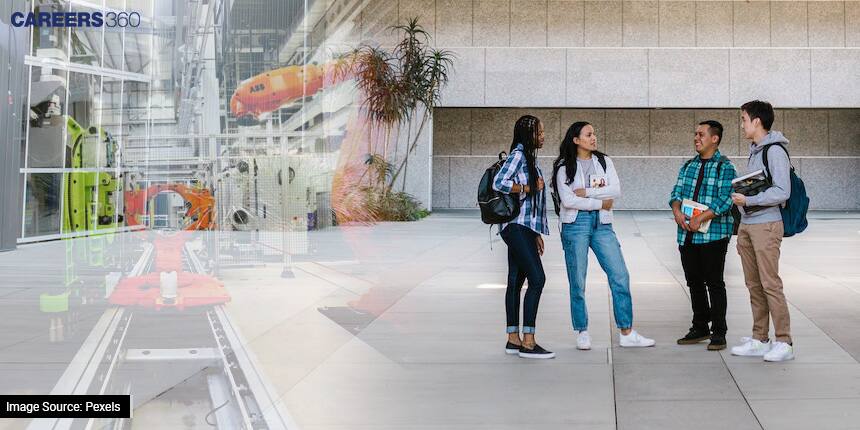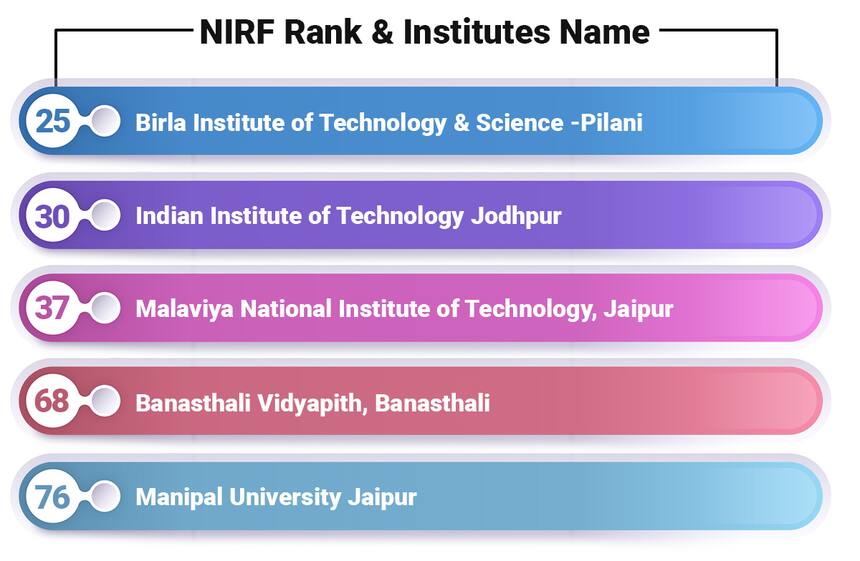NIRF 2023: Campus Placement Analysis At The Best Engineering Colleges In Rajasthan
Rajasthan, a land of vibrant culture and rich heritage, is also home to some of the top engineering colleges in the country. As per the latest National Institute Ranking Framework 2023 (NIRF), the desert state has five engineering colleges listed among the top 100 engineering institutes in the country. Out of them, three institutes are ranked among the top 40 engineering institutes.

On an average 98.56 per cent of the students successfully graduated and 88.3 per cent of the students successfully recruited during the campus placement drive 2021-22. students who were placed got the average median salary of Rs. 11.34 lakh per annum. Also, around 5.91 per cent of the students went for higher studies. When it comes to pursuing engineering in Rajasthan, the options are diverse.
In this comprehensive guide, Careers360 has analysed the top engineering colleges of Rajasthan, providing valuable placement insights, data, and analysis to help students make informed choices and embark on their journey toward excellence. Here are some of the top engineering colleges in the state with their NIRF2023 rank.
The top engineering colleges in the state are given below.

Top Engineering Colleges Of Rajasthan
Out of the total graduates 5,622, around 4,964 students were successfully placed-88.3 per cent. Birla Institute of Technology & Science - Pilani (BITS Pilani), ranked at an impressive 25th position in the NIRF 2023. The institute is an exceptional platform for budding engineers, notably, 2,470 students found placement opportunities, with a median salary of 18.2 lakhs per annum.
As we all know that IITs are the most prestigious engineering institutes across the nation but in Rajasthan Indian Institute of Technology Jodhpur had the lowest placement percentage compared to other institutes- 79.23 per cent.
Given below are the numbers of intake, enrollment, graduation and placement by institute.
Name | Intake | Enrolled | Graduated | Placed |
Birla Institute of Technology & Science -Pilani | 2779 | 2779 | 2762 | 2470 |
Indian Institute of Technology Jodhpur | 247 | 219 | 207 | 164 |
Malaviya National Institute of Technology, Jaipur | 648 | 698 | 655 | 549 |
Banasthali Vidyapith, Banasthali | 930 | 869 | 853 | 759 |
Manipal University Jaipur | 1178 | 1139 | 1145 | 1022 |
Only Manipal University Jaipur had 17 students added via lateral entry admission .
Also check - Placement Report Analysis Of Top Engineering Colleges In Telangana
Higher Education and Salary Details
For aspiring engineers, it's not just about the college but also about the opportunities that follow after graduation. Here's a glimpse into the higher education prospects and median salaries for graduates from these premier engineering institutes. Around 5.91 per cent of students opted for higher studies rather than immediate job placements. For those pursuing placements, the median salary was an impressive Rs. 11.34 lakhs per annum.
Although IIT Jodhpur had lowest placement percentage, it had an impressive 20.77 per cent of graduates opt for further studies, securing a median salary of 15 lakhs per annum.
Top Engineering Colleges: Higher Education (%) and Salary Details (In Lakh Rs.):
Name | Higher studies | Median Salary |
Birla Institute of Technology & Science -Pilani | 3.22 | 18.2 |
Indian Institute of Technology Jodhpur | 20.77 | 15 |
Malaviya National Institute of Technology, Jaipur | 1.22 | 9 |
Banasthali Vidyapith, Banasthali | 8.32 | 7.5 |
Manipal University Jaipur | 10.57 | 7 |
Also Check- NIRF 2023: Analysis Of Punjab Engineering Colleges and Placement Insight
Choosing the right engineering college is an extremely important decision in your academic and professional journey. Rajasthan offers a bouquet of top-tier institutions that not only impart quality education but also open doors to exciting career prospects. The data presented here is a valuable resource for engineering aspirants, aiding them in making informed choices about their educational future.
Whether you aspire to be a computer scientist, mechanical engineer, or any other engineering professional, Rajasthan's engineering colleges provide a solid foundation to achieve your dreams.
Also check - Odisha's Top Engineering Colleges Placement Report For 2023
